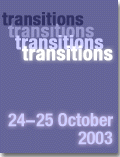
|
 |
Papers from the Colloquium
Theme 4: Evidence and Context
Respondent: Dr Hasok Chang
Department of Science and Technology Studies, University College
London
I would like to begin by noting a fundamental agreement with Jason
Davies: considering something as a hypothesis, or assessing evidence
for it, only makes sense in a broader context. But I have
a slight disagreement as well, since I think that the context is
not always a narrative. Quite often the relevant context
is structure. For a very simple example, take something
called Prout's hypothesis from 19th century chemistry. This was
the idea that all chemical elements had atomic weights that were
integer multiples of the atomic weight of hydrogen. This idea made
sense in the context of an organised system of chemical elements,
but there was no discernible narrative underlying that system.
(And there may well be yet other types of contexts, too, in addition
to narrative and structure.)
I think it is indeed important to note that these contexts are
rooted in the academic disciplines in which we work. Jason's emphasis
on narratives, in itself, seems to be a product of a particular
disciplinary context, namely that of the historical sciences. But
that does not invalidate his main point (here I am collapsing two
of his levels, narrative and discourse): these contexts are what
define disciplines, and we expect clashes when different disciplines
come together.
I would like to take a broader view of evidence, as reasons for
believing something. Then it becomes clear that what counts as
evidence at all depends very much on the disciplinary context,
which provides the standards of evidence. (Thomas Kuhn made a similar
point in his discussion of incommensurability.) Let me go back
to the example of Prout's hypothesis. For most chemists, only results
of chemical analyses counted as evidence for or against Prout's
hypothesis. For later physicists, separation of isotopes by the
mass spectrometer was the key; for example, chlorine with its atomic
weight of 35.5 seemed to violate Prout's hypothesis, but chlorine
on earth turned out to be an accidental 3:1 mixture of two isotopes,
chlorine-35 and chlorine-37. For William Prout himself, metaphysical-theological
arguments were important, as what recommended the hypothesis to
him was the simplicity that must be present in God's plan for the
universe.
Departing slightly from Jason's talk now, I would like to make
a few remarks on the nature of evidence and interdisciplinarity at
the point of action. Why is there interdisciplinary clash
at all? Why don't we just have disconnection and mutual incomprehension
between different disciplines? Disciplines clash only because they
actually come together. And it is when there are specific, concrete
problems to solve that disciplines tend to come together. For example,
sending an astronaut into space requires input from physics, astronomy,
computer science, materials science, chemistry, nutrition, physiology,
psychology, and even politics. And there are clashes in evidential
considerations because different contexts generate different reasons
for believing something or not.
Finally, since we are not simply discussing interdisciplinarity
in general but interdisciplinary studies of higher education, I
must ask: how does all of this bear on higher education? In higher
education we do have concrete problems to solve. If anyone had
doubts about that, the recent case of the discussion of the proposed
merger with Imperial College should have dispelled them. In the
course of that discussion, educational philosophy mixed with economics,
pedagogy with transport and infrastructure, and history came to
bear on everything else. Heads of different departments were suddenly
engaged in serious conversations with each other. The lesson, I
think, is that we do always have concrete problems to solve in
higher education, though this only came to be apparent thanks to
a drastic problem. That, in my view, is one of the strongest arguments
for promoting interdisciplinary studies of higher education.
|
 |


|


![]() +44 (0)20 7679 2000 - Copyright © 1999-2006
UCL
+44 (0)20 7679 2000 - Copyright © 1999-2006
UCL